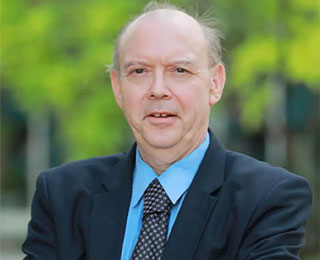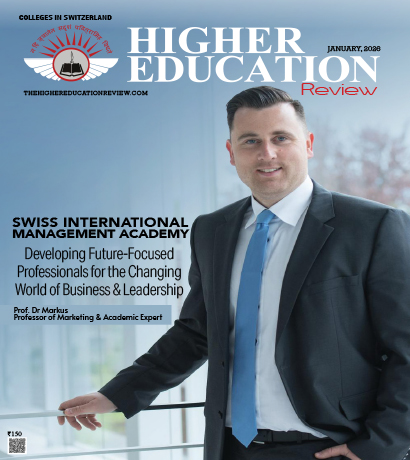Top 10 Benefits Of Pursuing An Executive MBA

Dr. Gary Stockport, Dean EMBA & Professor Strategy, S P Jain School of Global Management
Studying for a part-time Executive MBA (EMBA) has become increasing popular these past years. EMBA Courses are part-time in nature, typically completed in 18 months and targeted at working professionals who are able to bring some years of working experience into the classroom. There are many benefits of pursuing an EMBA. The list below is not an exhaustive one but will enable persons contemplating doing one know some of the key benefits. These are not ranked in any particular order but can be looked at in sum. These are:
• Transitioning to a Generalist
An EMBA is a generalist management master degree. Participants learn new knowledge and skills to analyze issues from putting on many different 'hats' such as: Accounting; Finance; Marketing; HR; Strategy and more. Consequently, this helps to transition persons from being a specialist to becoming a generalist.
• Becoming a Leader
An important goal of undertaking an EMBA is to become an effective leader whether this is achieved during studies or afterwards. This includes building critically important leadership competencies such as strategic thinking and business acumen. Participants learn how to make business decisions based upon incomplete data and therefore help them to cope with the ambiguity and complexity that managerial jobs nowadays typically contain.
• Study Whilst Working
EMBA Courses are typically taught weekends and / or evenings and out of the fray of a hectic work schedule during standard working hours. Consequently, this enables participants to focus upon their studies within an 'uninterrupted' quiet study learning environment. Online EMBA courses offer increased flexibility here as students can access from anywhere; work, home or elsewhere whilst travelling. Of course, part-time study also enables participants to continue to earn a salary.
• Career Acceleration
EMBA students are typically ambitious. They want to see the time and cost of study translated into professional career acceleration and growth. It is quite common for a student's career to progress during their studies and there is certainly no need to wait until after studies are complete.
"Having an EMBA on a CV might just be the difference between a person getting the job if he / she is compared with someone who has a similar track-record of work experience but does not have one"
• Applying What You Learn Immediately
Doing an EMBA enables students to apply what they learn in class immediately back at work. Assessments are applied in nature and some may specifically relate to the student?s employer. Consequently, this enables the completed work to be showcased back at work and sometimes even implemented.
? Soft Skills
The best EMBA Courses focus upon the development of the students? soft skills (as well as the hard skills). These include the ability to speak to an audience with clarity and confidence. Furthermore, fine-tuning listening skills as well as building empathy. The importance of building empathy was emphasized by Satya Nadella, CEO Microsoft in his book 'Hit Refresh' as a part of the cultural change within Microsoft.
• Learning from State-of-the-Art Academics and Practitioners
Typically, Faculty teaching on an EMBA bring many years of work experience into the classroom. This has been attained working full-time in the Public or Private Sectors or through undertaking consulting. Therefore, the real world of business is brought into the class and is looked at through the 'lenses' of models, frameworks and theory. Many also bring applied research into the learning including works published in quality academic Journals. The latter helps to add academic rigor into the degree.
• Building A Professional Network for Life
Doing an EMBA is an ideal way of building a professional network of peers for life with student peers and Alumni. As is often commented: 'It is not what you know but who you know that counts' for career progression. The best EMBA Courses offer many opportunities for you to network whether inside or outside of the classroom with current students and Alumni.
• Turbo-Charging a CV
An EMBA helps to turbo-charge a CV. Having an EMBA on a CV might just be the difference between a person getting the job if he / she is compared with someone who has a similar track-record of work experience but does not have one. For any Selection Panel, having an EMBA denotes that the person applying can cope with a high workload and is therefore effective at time management. Generally, the person being considered has been able to balance work, home and study.
• Extended Professional Development
Doing an EMBA enables a student to focus upon their professional development over an extended period of time. Although it's likely that participants will undertake much shorter Executive Development courses later in their career, this opportunity through studying across 18 months is not likely to be repeated again. That's why it's often grabbed with both hands!
It is often said that: "Doing an EMBA is the best strategic investment decision that you will ever make." Why don't you do one and find out for yourself?!
Dr. Gary Stockport, Dean EMBA & Professor Strategy
Dr. Gary Stockport is the Professor - Strategy, Dean - Executive MBA and Chair - Exam Board at the SP Jain School of Global Management. He has had a global career having studied, lived and worked in the UK, New Zealand, Australia, South Africa and currently the UAE. He has a Doctor of Philosophy (PhD) and his thesis is titled: Developing Interorganisational Networks within an Incubator on a Science Park. He was the first person to receive a Doctoral scholarship from the Cranfield School of Management, UK. His PhD has been used as best research practice by the Economic and Social Research Council (ESRC), UK, which was the UK's leading and training agency addressing economic concerns. He had received funding from the British Council, UK, to visit India and study their Science Parks.
• Transitioning to a Generalist
An EMBA is a generalist management master degree. Participants learn new knowledge and skills to analyze issues from putting on many different 'hats' such as: Accounting; Finance; Marketing; HR; Strategy and more. Consequently, this helps to transition persons from being a specialist to becoming a generalist.
• Becoming a Leader
An important goal of undertaking an EMBA is to become an effective leader whether this is achieved during studies or afterwards. This includes building critically important leadership competencies such as strategic thinking and business acumen. Participants learn how to make business decisions based upon incomplete data and therefore help them to cope with the ambiguity and complexity that managerial jobs nowadays typically contain.
• Study Whilst Working
EMBA Courses are typically taught weekends and / or evenings and out of the fray of a hectic work schedule during standard working hours. Consequently, this enables participants to focus upon their studies within an 'uninterrupted' quiet study learning environment. Online EMBA courses offer increased flexibility here as students can access from anywhere; work, home or elsewhere whilst travelling. Of course, part-time study also enables participants to continue to earn a salary.
• Career Acceleration
EMBA students are typically ambitious. They want to see the time and cost of study translated into professional career acceleration and growth. It is quite common for a student's career to progress during their studies and there is certainly no need to wait until after studies are complete.
"Having an EMBA on a CV might just be the difference between a person getting the job if he / she is compared with someone who has a similar track-record of work experience but does not have one"
• Applying What You Learn Immediately
Doing an EMBA enables students to apply what they learn in class immediately back at work. Assessments are applied in nature and some may specifically relate to the student?s employer. Consequently, this enables the completed work to be showcased back at work and sometimes even implemented.
? Soft Skills
The best EMBA Courses focus upon the development of the students? soft skills (as well as the hard skills). These include the ability to speak to an audience with clarity and confidence. Furthermore, fine-tuning listening skills as well as building empathy. The importance of building empathy was emphasized by Satya Nadella, CEO Microsoft in his book 'Hit Refresh' as a part of the cultural change within Microsoft.
• Learning from State-of-the-Art Academics and Practitioners
Typically, Faculty teaching on an EMBA bring many years of work experience into the classroom. This has been attained working full-time in the Public or Private Sectors or through undertaking consulting. Therefore, the real world of business is brought into the class and is looked at through the 'lenses' of models, frameworks and theory. Many also bring applied research into the learning including works published in quality academic Journals. The latter helps to add academic rigor into the degree.
• Building A Professional Network for Life
Doing an EMBA is an ideal way of building a professional network of peers for life with student peers and Alumni. As is often commented: 'It is not what you know but who you know that counts' for career progression. The best EMBA Courses offer many opportunities for you to network whether inside or outside of the classroom with current students and Alumni.
• Turbo-Charging a CV
An EMBA helps to turbo-charge a CV. Having an EMBA on a CV might just be the difference between a person getting the job if he / she is compared with someone who has a similar track-record of work experience but does not have one. For any Selection Panel, having an EMBA denotes that the person applying can cope with a high workload and is therefore effective at time management. Generally, the person being considered has been able to balance work, home and study.
• Extended Professional Development
Doing an EMBA enables a student to focus upon their professional development over an extended period of time. Although it's likely that participants will undertake much shorter Executive Development courses later in their career, this opportunity through studying across 18 months is not likely to be repeated again. That's why it's often grabbed with both hands!
It is often said that: "Doing an EMBA is the best strategic investment decision that you will ever make." Why don't you do one and find out for yourself?!
Dr. Gary Stockport, Dean EMBA & Professor Strategy
Dr. Gary Stockport is the Professor - Strategy, Dean - Executive MBA and Chair - Exam Board at the SP Jain School of Global Management. He has had a global career having studied, lived and worked in the UK, New Zealand, Australia, South Africa and currently the UAE. He has a Doctor of Philosophy (PhD) and his thesis is titled: Developing Interorganisational Networks within an Incubator on a Science Park. He was the first person to receive a Doctoral scholarship from the Cranfield School of Management, UK. His PhD has been used as best research practice by the Economic and Social Research Council (ESRC), UK, which was the UK's leading and training agency addressing economic concerns. He had received funding from the British Council, UK, to visit India and study their Science Parks.

